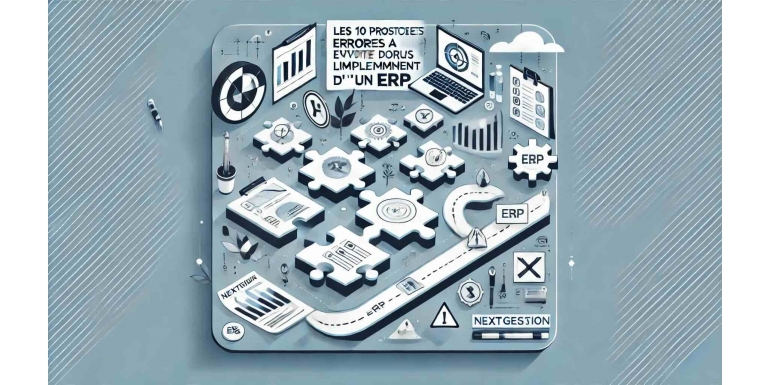
The Top 10 Mistakes to Avoid When Implementing an ERP
Implementing an ERP (Enterprise Resource Planning) is a major strategic project that can transform a company, improve its operational efficiency, and provide a competitive advantage. However, the implementation of an ERP is complex and can fail if not managed properly. In this article, we will examine the top 10 mistakes to avoid to ensure the success of your ERP implementation project.
1. Not Setting Clear and Measurable Objectives
Many companies embark on ERP implementation without having defined clear and measurable objectives. This approach can lead to scope creep, budget overruns, and unsatisfactory results.
Before starting, define specific, measurable, achievable, realistic, and time-bound (SMART) objectives. For example, you might aim for a 20% reduction in inventory costs or a 15% improvement in forecast accuracy within 12 months of the ERP implementation.
2. Underestimating the Importance of Planning
A lack of detailed planning is one of the main causes of ERP project failure. Without a clear roadmap, teams can lose sight of priorities and deadlines.
Develop a detailed project plan that includes implementation phases, required resources, responsibilities, and timelines. Ensure that each step is well-documented and understandable to all stakeholders.
3. Neglecting Change Management
ERP implementation often leads to significant changes in business processes, which can cause resistance within teams.
Implement an effective change management strategy. Clearly communicate the reasons for the change, the expected benefits, and involve end-users from the beginning. Provide comprehensive and continuous training to help employees adapt to new processes.
4. Choosing an ERP Unsuitable for Your Needs
Purchasing an ERP that does not meet your company's specific needs can lead to inefficiencies and frustrations.
Conduct a thorough analysis of your needs before choosing an ERP. Select a solution that not only meets your current business requirements but can also evolve with it. Consider industry-specific features and ensure the ERP can handle them.
5. Not Involving Key Stakeholders
The lack of involvement of stakeholders, such as executives, department heads, and end-users, can compromise the success of the project.
Involve all stakeholders from the beginning of the project. Organize workshops to gather their needs and expectations, and ensure their concerns are addressed in the project planning.
6. Ignoring Testing Before Deployment
The absence of rigorous testing before ERP deployment can lead to critical failures that disrupt operations.
Plan comprehensive ERP tests in a simulation environment before deployment. Test all critical processes, including integrations with existing systems, to identify and correct potential issues.
7. Underestimating Implementation Costs
Many companies underestimate the total cost of ERP implementation, leading to budget overruns.
Set a realistic budget that includes not only initial licensing and implementation costs but also customization, training, maintenance, and technical support costs.
8. Failing to Ensure Integration with Existing Systems
An ERP that does not properly integrate with existing systems can create data silos and operational inefficiencies.
Ensure that the ERP can integrate seamlessly with your other software, such as inventory management, payroll, or CRM systems. Invest in integration solutions that facilitate data transfer between systems.
9. Neglecting User Training
A high-performing ERP cannot deliver its full potential if users are not properly trained.
Develop a training program tailored to the needs of different ERP users. Ensure that training is ongoing and includes follow-up sessions after deployment to address issues and questions.
10. Not Planning for Post-Launch Support
Once the ERP is deployed, companies may encounter issues that require technical support. Failing to plan for adequate support can lead to service interruptions.
Set up robust technical support to meet users' needs after launch. This can include an internal team or a contract with the ERP provider to ensure quick assistance.
Conclusion
ERP implementation is a critical step in modernizing your company's operations. By avoiding the common mistakes mentioned in this article, you can increase your chances of success and ensure that your ERP delivers the expected benefits. Careful planning, adequate training, and effective change management are essential to getting the most out of your ERP.
